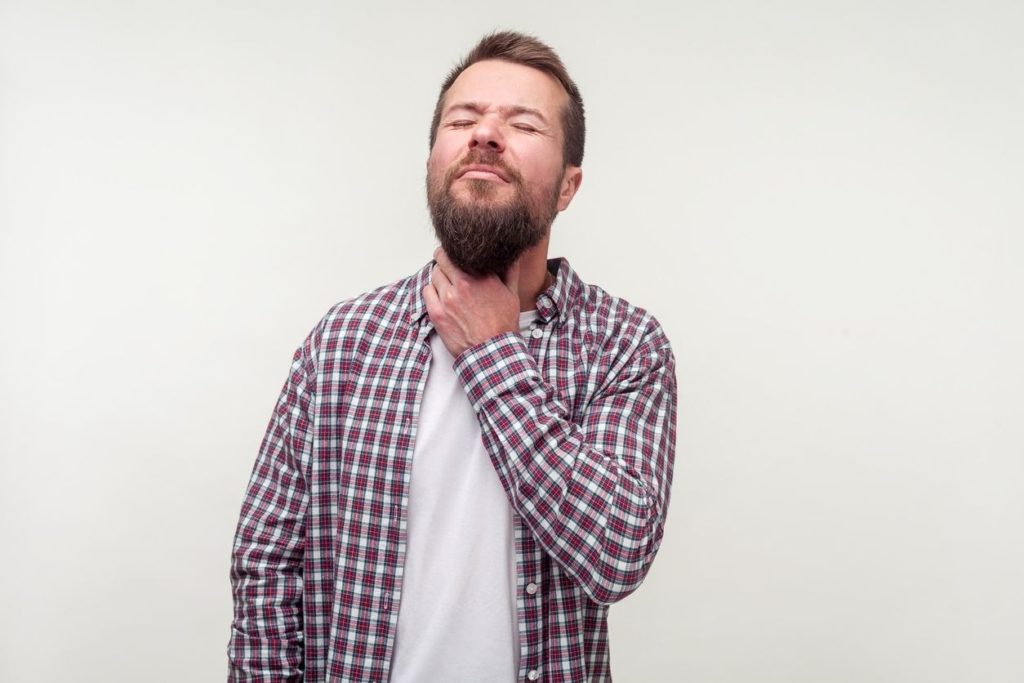Anguish and tight throat from shortness of breath ?
Caution : You must consult your doctor for your health. This page presents only a personal and alternative point of view which should not be considered as an attempt to prescribe medicine.
Controlling your emotions can sometimes be difficult in certain situations.
And when you lose control, you can easily find yourself short of breath, anxious with a tight throat.
Knowing how to relax therefore becomes an imperative.

Shortness of breath
Shortness of breath is a normal sensation that follows intense physical exertion.
It is a physiological mechanism which results in the increase of the respiratory rate and which aims to bring more oxygen to the whole body.
But when shortness of breath occurs without prior intense physical exertion, it is problematic.
The causes of abnormal shortness of breath (i.e. apart from intense physical exertion) are diverse.
When it is abnormal, shortness of breath can result from cardiac pathologies (in particular heart failure), respiratory (pulmonary), metabolic pathologies (eg overweight).
It can also come from stressful situations like anxiety or panic attacks.
When it comes from stressful situations, one literally feels suffocated.
The heart races, the breath is short and it becomes difficult to breathe.
Whether or not it follows intense physical exertion, it is always advisable to monitor your condition during and after shortness of breath, at the risk of missing out on a much more serious problem.
If you are easily short of breath, it is better to stop smoking.
Avoid exposure to any source of air pollution as much as possible.
Also make an effort to lose weight if you are overweight.
Anguish
Anguish, which is intense anxiety, is a psychological phenomenon manifested by deep anxiety.
The latter is due to a feeling of imminent threat or which follows a stressful event (hence the fact that we also consider anxiety as stress).
Certain medications and medical conditions can also cause anxiety.
So in which case can the anxiety be accompanied by shortness of breath?
Anxiety disorders can be expressed in many ways.
They can manifest themselves by anxiety attacks, passing by a generalized and almost constant anxiety, to arrive at a very precise phobia.
Anxiety can cause throat muscles to tighten, depression, sleep disturbances, palpitations or even suppress appetite.
What to do then?
One of the best methods is to practice abdominal breathing to calm down and catch your breath.
Tight throat
Having a blockage in your throat or esophagus can be a sign of stress.
It can arise as a result of strong emotions.
When this happens, it feels like a lump is created in the throat.
However, this feeling is not at all physical, but mental, because in reality nothing is really in the throat.
Drinking water or eating something can help make this feeling go away.
In some cases, the onset of this sensation may be medical: it may be inflammation, gastric reflux, esophageal or thyroid disorder.
If you are a person who suffers from anxiety, knowing how to practice the appropriate breathing relaxation techniques can prevent this feeling.
One of the most common respiratory signs when the body is in distress is shortness of breath.
One of the most common digestive signs is a tight throat.
This inevitably leads to a blockage of the diaphragm.
Thus, it is essential to release it to reduce shortness of breath, anxiety and of course make the feeling of a tight throat disappear.
You can therefore watch this video workshop which will give you a lot of advice.
However, do not hesitate to see a doctor if the anxiety gets out of hand or intensifies.
❤ The ultimate guide to breathing
Intermittent Breathing : Discover the method to quickly relieve your anxiety and chronic fatigue (positive effects from the first use).Read also :
Previous article : Constant shortness of breath in the elderly : what solution ?
Next article : Dyspnea in sport and physical exercice : how to remedy it ?

